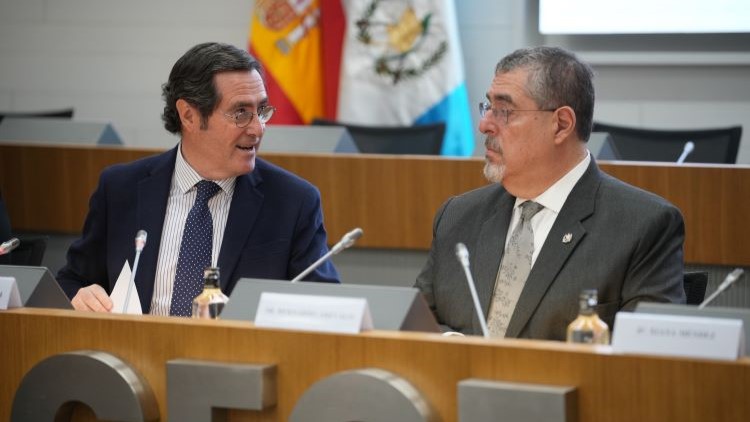Eduardo González
The president of Guatemala, Bernardo Arévalo, yesterday encouraged Spanish investors to “participate in the Guatemalan economy” in order to help the country overcome the “terrible indicators of social development” suffered by “the vast majority of the population.”
“Guatemala has an enormous historical debt with the vast majority of its population, so that it can achieve basic living conditions, decent living conditions and access to fundamental services,” said Arévalo during his speech at the Spain-Guatemala Business Meeting, organized in Madrid by the Spanish Confederation of Business Organizations (CEOE), the State Secretary for Commerce and the Chamber of Commerce of Spain, in collaboration with the Embassy of Guatemala in Spain.
According to the Guatemalan president, who was visiting Spain as part of his first tour of Europe since taking office on January 14, the indicators on social development in his country are “terrible” because the growing economic evolution of Guatemala “is not translating into indicators of collective well-being.” “Large contingents of the population, 60 percent, are below the poverty level and there are enormous problems of malnutrition and lack of access to basic services such as health and education,” he lamented.
The “only way” to “systematically and effectively address the development deficits” that exist in Guatemala is to “increase productivity and create employment, generate more opportunities for access to education and health, build infrastructure and ensure that subsistence farmers become small agricultural producers hooked on value chains,” he continued. “It is essential that there be a Government that invests in basic needs, schools, hospitals and transportation infrastructure, among other areas, to be able to help the population,” and, to do so, the Government “needs partners for development,” he stated. Arevalo.
For this reason, he stated, “we invite you (Spanish companies) to continue and increase investments in Guatemala, to believe in Guatemala and in a Government that is determined to ensure that the institutions begin to function.” “We are committed to legal certainty and the rule of law, because that is how the people’s trust has been mobilized, and for that we must continue fighting corruption to generate transparency,” he continued.
“We are going to invest in irrigation programs, microcredit to support farmers, in roads and infrastructure” and, in this context, “numerous opportunities for collaboration, through public-private alliances, will be presented for Spanish companies,” who will be eligible for “the tenders that we hope to be able to present soon,” he concluded.
Association Agreement between Central America and the EU
At the same event, the Minister of Economy of Guatemala, Gabriela García, assured that the Arévalo Government wants to generate confidence among Spanish investors and highlighted, in this regard, the importance of the Association Agreement between Central America and the European Union to generate “certainty legal” in bilateral trade and investment relations. Likewise, she assured that Guatemalan exports complement the demand of Spanish producers in sectors such as the agri-food industry, fresh products, textiles or the pharmaceutical sector and that Guatemala is the largest economy in Central America and provides a gateway to markets. more important.
For her part, the State Secretary for Commerce, Xiana Méndez, recalled that Spain continues to be the main European investor in Guatemala, with an investment of more than 1.5 billion euros, to which must be added the investments made by the numerous Spaniards who have arrived in Guatemala over the years to integrate into the country. Furthermore, trade flows between Spain and Guatemala have grown in the last ten years at an average rate of around 10%, an evolution to which “the Association Agreement between Central America and the European Union has contributed decisively.”
According to the president of the CEOE, Antonio Garamendi, “Guatemala’s membership in the Central American Integration System (SICA), the fact that it is a border country with Mexico, its corridor to North America and its active participation in the Ibero-American Summits make this country a priority for Spanish companies with interests in the region, taking into account that it offers proximity and preferential access to key markets globally.”
For his part, the president of CACIF (the Guatemalan counterpart of the CEOE), Ignacio Lejárraga, recalled that, in recent years, the public-private initiative Guatemala does not stop has been promoted, a plan that has achieved “great success” and which consists of five pillars: a roadmap with forceful actions to attract investments, competitiveness and business climate for the legal security of investors, infrastructure, human capital and tourism.
Finally, Ángel Asensio, vice president of the Chamber of Spain, recalled that bilateral trade in goods between Spain and Guatemala has tripled in the last ten years, reaching 630 million euros in 2023. “Guatemala is a trade and investment partner of first order for Spain in the Central American region,” he added.
SEGIB and CEAPI
After his intervention at the CEOE event, Bernardo Arévalo met with the Ibero-American Secretary General (SEGIB), Andrés Allamand, with whom he agreed to send a SEGIB mission to Guatemala to identify matters of interest to the new authorities that may be addressed in the field of Ibero-American Cooperation, such as gender, indigenous peoples, digitalization (electronic government and transparency) and food security, with a focus on child malnutrition. Allamand attended President Arévalo’s change of command last January and SEGIB supported the international community’s joint declaration of support for the new Government and the Guatemalan democratic process.
On Thursday night, the president of Guatemala spoke at an event of the Business Council Alliance for Ibero-America (Consejo Empresarial Alianza por Iberoamérica, CEAPI), in which he stated that, “to achieve real change, we need to generate economic momentum through public money and support.” of private capital”, and therefore, it is necessary “for companies to invest and generate jobs in the country.” For her part, the president of CEAPI, Núria Vilanova, described the president as “brave and a fighter” who “has faced a situation like the one Guatemala has experienced in recent months.”





